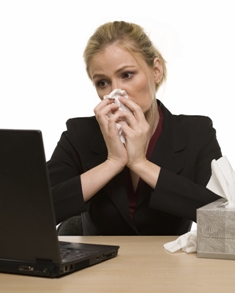
Dear Working Wise:
Are there any rules-of-thumb around coming to work sick? I’m always on my guard to try and stay healthy, but many of my co-workers come in to work sick – putting me at risk. What can I do? Signed, Sick of Co-workers
Dear Sick:
Many people go to work sick despite the risk of infecting others. In fact, most of us have done it in the last year. A 2010 survey by CareerBuilder.com found that nearly 75 per cent of workers usually go to work while they are sick and more than half reported feeling guilty when they did stay home.
Your co-workers may be coming to work sick to show that they are team players—but as you have pointed out, they are putting the rest of the team at risk.
Staying home when you are sick protects your co-workers, helps you get better faster, and saves your employer money by preventing other workers from getting sick.
Of course, staying home isn’t always possible. Some employers do not offer sick benefits. And sometimes the work simply can’t wait until you are feeling well.
If you must work while you are sick, you can help protect your co-workers by:
o Working from home until you are no longer contagious;
o Washing your hands frequently;
o Coughing/sneezing into your arm instead of your hand;
o Avoiding close contact with your co-workers;
o Avoiding shared work tools, e.g., photocopiers, staplers, whiteboards, keyboards, kitchen items, etc., or cleaning them after you have used them.
You can help protect yourself by washing your hands frequently, keeping your unwashed hands away from your mouth, nose and eyes, avoiding close contact with ill co-workers, and being mindful when using shared work tools.
You might want to keep a bottle of hand sanitizer close by and possibly some disinfectant wipes so you can quickly clean shared items. Viruses can survive for up to 48 hours on hard surfaces according to the Public Health Agency of Canada.
Other things you can do to protect yourself include getting immunized and improving your resilience by ensuring you are eating healthy, getting enough sleep, and exercising regularly.
You might also want to raise your concern with your supervisor and explain that presenteeism—coming to work sick—actually costs the company money. Studies show that presenteeism costs companies more money than paid sick days.
Your supervisor may not know how common the problem is. An OfficeTeam survey found that only 17 per cent of executives thought that their staff were coming into work very frequently.
Your supervisor can do a lot to set the expectations around what all employees should do when they are sick.
Do you have a work-related question? Send your questions to Working Wise, at charles.strachey@gov.ab.ca. Charles Strachey is a manager with Alberta Human services. This column is provided for general information.
















